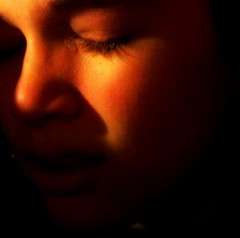Do I Dare Dream? Nightmares, Panic and PTSD
I'm sitting in my apartment, my mind playing fast and loose with past and present, time and space. It's humid and muggy and I haven't slept properly in weeks.
What makes Nightmare on Elm Street seem like Annie?
The symptoms of my anxiety disorder are intense, lately. Its been difficult to distinguish now from then. My mind's confusing, imprecise, and I have very very vivid dreams; Mostly the result of post traumatic triggers I haven't been able to cope with during the day.
When I stir, I still taste and feel and smell the content of those dreams. Like they're beyond normal memory: etched into my body, eating at awareness, and even upon waking, the nightmare's all I know.
I'll hear noises in the street and my brain reinterprets them in the context of my already switched-on fears; Fears that have long since past their used-by date.
Terror doesn't care. Time is a minor technical detail in the face of the shadows PTSD can conjure when it ties one hand behind my back and takes over my brain.
My anxiety disorder knows what I'm afraid of and it doesn't mind showing me just how well. Over and over again.
Anxiety: Scared to sleep
PTSD nightmares typically have pieces of trauma mixed in with metaphor; These are not ordinary dreams.
People with PTSD dream of being chased, trapped, and controlled by their fears. Overwhelmed by panic and trauma, either through metaphor or more directly (flashbacks while you sleep), and unable to escape in spite of their best efforts. That is: the reality of trauma. In a nutshell.
What is there to be grateful for about a bad dream?
The traumatic experiences that underlie post traumatic stress disorder are rarely recalled as complete memories; They are the glass shards of a long-since shattered vase.
If I pick just one up, it doesn't make sense. I don't know where it's meant to go, or what I'm supposed to do. But in my dreams, my mind is sometimes cleverer than fear.
Coping with trauma: remembering
The unconscious mind can meet up with the conscious a little more directly when we're asleep. It can change traumatic memory, put a few pieces together: show me what I'm unable to tolerate when I'm awake, busy dealing with the day.
It's not possible to understand it all at once. The memories are too much for me (too much for anybody, if you ask my therapist); Which is why my mind split it up in the first place.
But slowly, and in careful doses, things will come back to me. If I can remember enough from my dreams, I know they are trying to tell me what would make the pictures in my head make sense, what could get me one step closer to treating anxiety, and healing post traumatic stress.
APA Reference
White, K.
(2011, March 26). Do I Dare Dream? Nightmares, Panic and PTSD, HealthyPlace. Retrieved
on 2026, January 22 from https://www.healthyplace.com/blogs/treatinganxiety/2011/03/do-i-dare-dream-nightmares-panic-and-ptsd
Author: Kate White
"Dreams are royal way to our unconscious" is pivotal conclusion of S. Freud as scientific interpreter of dreams. In addition of this, they ventilate our psychic apparatus to maintain the equilibrium of psychological state. As it is known the core of anxious disorders underlines just in unconscious part of mind. In psychoanalysis, this phenomenon is called as intra-psychic conflict. This conflict in spite of provocation of many dreaded form of anxiety, such are nightmares, panic, PTSD, the patient isn't able to perceive directly. The same may indirectly to display through dreams, jokes, lapses etc. With these psychological performances are delivered oneself, ever so little, from torment. In this direction, it is preferable to dream, in purpose to lighten our soul and mind from psychic suffers. Very anxious people don't dream because the can't remember them, even they dream. At that time when we will remember our dream starts our psychic recovery
Hi, this is Becky from More Than Borderline. Man, do I relate. When I was first diagnosed with PTSD (there's a school of thought that thinks BPD is a form of PTSD), I rarely slept. I'd either stay up until I collapsed from sheer exhaustion or drink until I passed out--all to avoid the dreams.
I'm on clonodine now, a blood pressure medicine with the side effect of minimizing nightmares. I still have them, but nowhere near as bad. My therapist has also attempted to teach me how to rewrite the nightmares when I wake up, which helps me calm down after waking up in a cold sweat.
You're right, and brilliant phrasing--trauma nightmares make Freddy Krueger look like he's ready to sing "Tomorrow".
I was diagnosed with PTSD in 2006. I can relate tou everything you said,
especially about the senses. My senses were so heightened, I could smell the cologne of one of my abusers from my past. My flashbacks were too much for me to bare and my body became paralized. I couldn't form regular words and FEAR controled my mind. Eventually PTSD turned to Chronic Depression then to Bipolar Disorder, and finally to Schizo-Affective Disorder. I am very greatful to be on the right medecine. It took a while, but I'm much better today. Thank you for your article on PTSD it's nice to share, I am new at this......THANKS, Laurie
Frackin' nightmares!
I used to dream of murder, that was a large part of what terrorised me when I slept. Just so unfair, its not as if our minds are busy enough dealing with terror!
For a moment I mis-read what you wrote about and thought it said: "Terror is a time machine". And it is, isn't it? It keeps us pinned to a spot on the map in time and space. It's difficult to get unpinned, get back to the present day and blow up that damn time machine once and for all...
But that'd be nice, wouldn't it? xo
